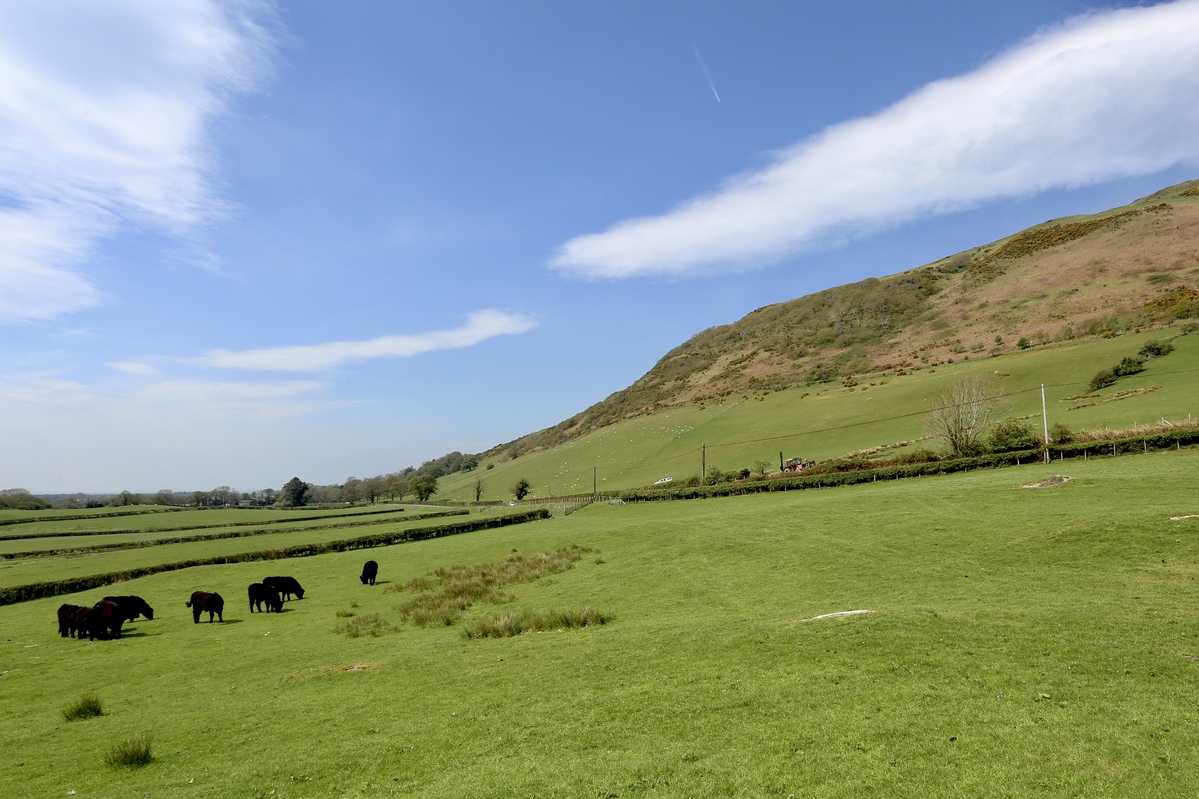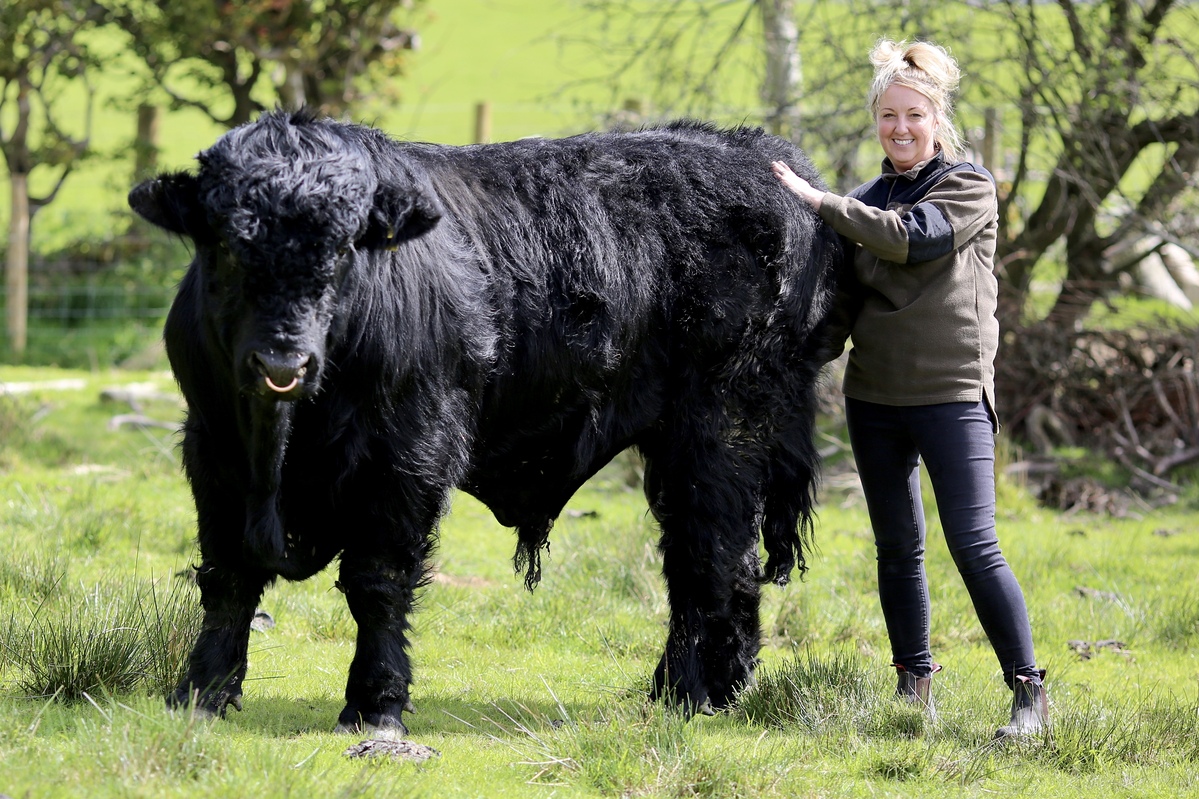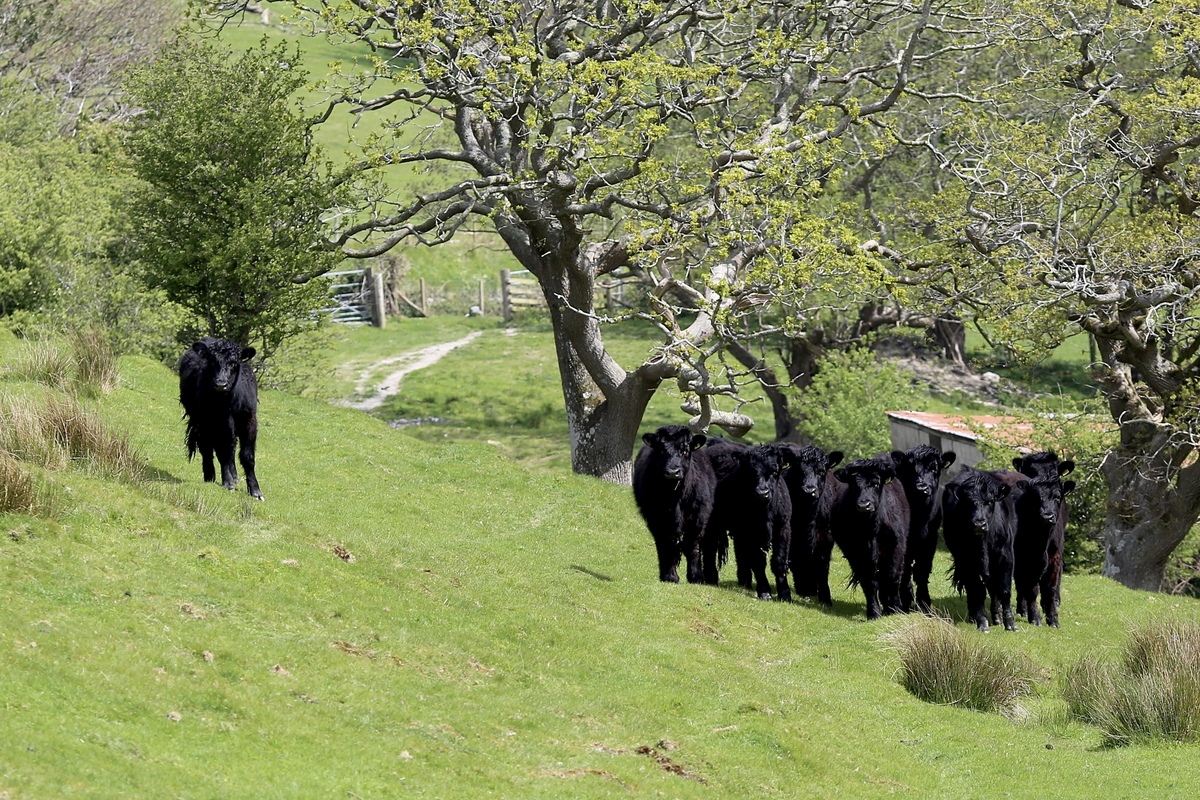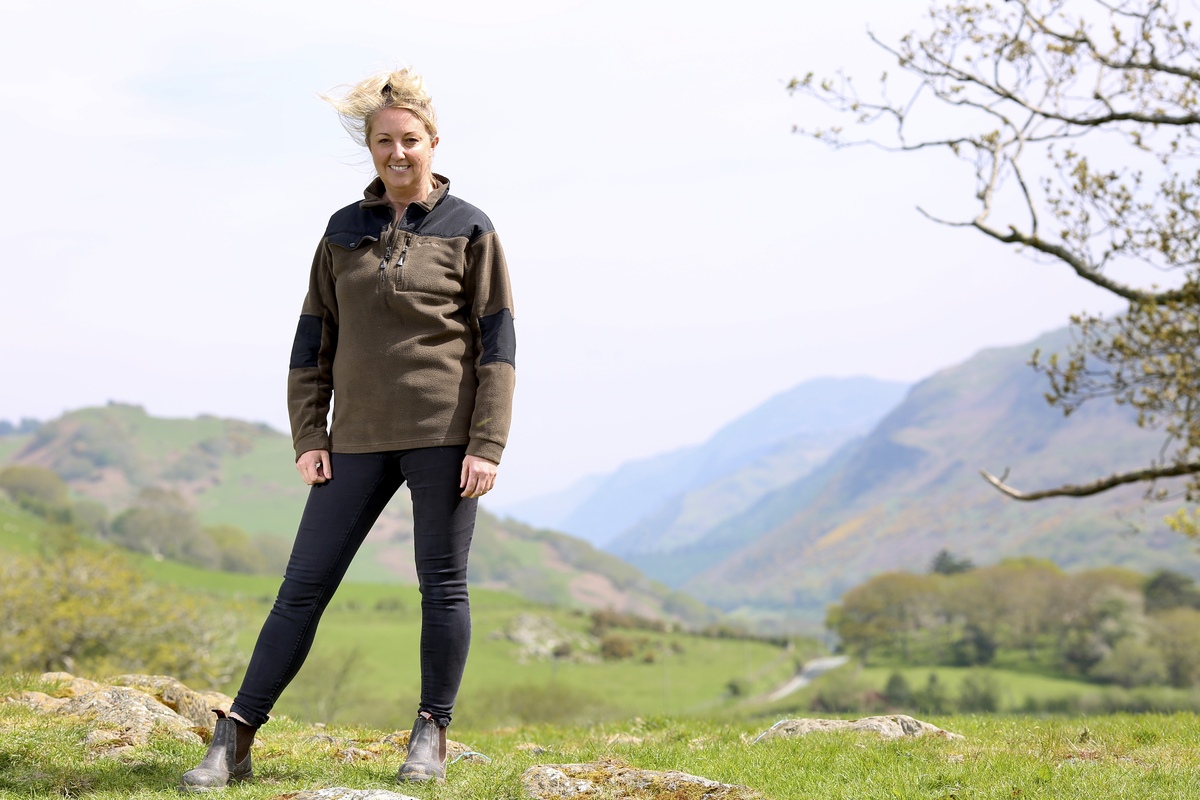In the early spring sunshine, the cattle grazing their first bite of grass at Dolaugwyn Farm are the link between the past and the future in this rural landscape, delivering the farming and environmental ambitions of the Williams family.
The Welsh Black cattle, Gwartheg Duon, are also an important connection to Jessica Williams’ childhood, and her beloved late father, Elwyn Pryce Evans, descendants of the four cows he gifted her when she was 18.
Gerddi Bluog
At that time her parents were converting the family farm near Harlech to organic and needed to reduce numbers in their Gerddi herd.
And so four of their best breeding cows formed the foundation of Jessica’s own herd, Gerddi Bluog, named after the family farm near Harlech, and she started farming in her own right on 30 acres of offlying land the Evanses owned three miles from the main holding.
Rhydgarnedd Welsh Blacks
Elwyn’s legacy now lives on at Dolaugwyn Farm, the holding at Bryncrug, Tywyn, that Jessica farms with her husband, Hugh, and his parents, Edward and Marian, and where she runs her herd alongside the Williamses’ Rhydygarnedd Welsh Blacks.
With a childhood immersed in farming, working in agriculture was a big draw for Jessica when she was considering her own career path, but she was encouraged by her parents to pursue a secondary career first.

University degree
“They said the farm would always be here, to go and get myself a profession, to have a secondary income and not be reliant on farming. Those were wise words,” she acknowledges.
Cardiff University beckoned and a degree in environmental health before a job as an environmental health officer at Gwynedd Council, all while running her cattle and small flock of Lleyn sheep.
HCC Scholarship
Her association with Welsh Blacks led to her becoming a Young Ambassador for the breed society and to a Hybu Cig Cymru-funded scholarship study visit to Australia.
Elwyn had always placed great weight on herd health, running a fully closed herd with artificial insemination used instead of buying bulls, and Jessica has shared that mindset, acquiring elite herd health status in the Premium Cattle Health Scheme.
Getting to that point and maintaining it is not cheap – it costs her over £1,000 a year for blood testing and for that reason she understands why it is not for everyone – but she sees it as a good investment. “It is good to not be in the dark about things, if we do pick up on a problem we are able to tackle it and stop it spreading.”

It also generates valuable sales with some of her cattle exported; overseas buyers, who have to invest in their own tests to establish a clean health record before the animals can be shipped, are confident before making that outlay that the cattle will pass all those checks.
Partneriaid Dolaugwyn
Jessica’s husband, a vet with his own practice, Williams Vets, also comes from a family of Welsh Black breeders, with 91 pedigree cattle in the Partneriaid Dolaugwyn, a partnership formed in 2018 when Jessica joined the business.
They also have 600 breeding ewes, mostly Welsh Mountains but with 100 pedigree Lleyns originating from Jessica’s flock.
A proportion of the female progeny from the Rhydygarnedd and Gerddi Bluog herds are retained every year as replacements and other breeding females sold at the Welsh Black Society’s pedigree sales. Steers are marketed through Farmers Marts in Dolgellau.
Meat boxes
The appetite for buying meat direct from the farm, which gathered momentum during the pandemic, laid the foundations for a secondary enterprise too.
Jessica already had good knowledge about meat boxes because, as a Farming Connect Agrisgôp leader, she ran groups that looked at their viability as a means of producers adding value to their meat.
A local abattoir, Cig Eryri – Snowdonia Meats – had opened in 2019 so having those slaughtering facilities, coupled with a growing number of inquiries from potential customers, was the catalyst to Jessica and Hugh dipping their toe into the water of direct sales.
They initially slaughtered one heifer and that led to further inquiries and so the meat box business was created.

Reducing food miles
“We are reducing food miles and allowing local people to consume meat that has been born and bred on our farm in their local area,” says Jessica.
While stock numbers have been cut in recent years to reduce input costs, there are still plenty of mouths to feed on the 550-acre holding.
The Welsh Mountain flock has been improved year-on-year by investing in two good Welsh Mountain breeding rams every year and selecting the best 300 ewes to run with them. The top 120 Welsh Mountain ewe lambs are retained as replacements.
200 Welsh Mountain ewes are bred to a Lleyn ram to produce commercial fat lambs.
To keep costs to a minimum, all lambs are finished off grass when possible.
Most of the lambs are sold through a local collection centre direct to Dunbia, and pedigree Lleyn ewe lambs and yearlings are sold at the Lleyn Sheep Society’s pedigree sale in Welshpool.
Environmental agreements
The farm has been in environmental agreements since they were first established with a Habitat Wales Scheme agreement currently in place.
“They have worked well here, we have done hedge restoration and management, fencing and used the cattle for environmental grazing, the farm has an abundance of wildlife and birds,” says Jessica.
Honeybees
There are honeybees too as the Williamses have their own hives, producing honey for family and friends.
Their 11-year-old twins, William and Sara, are very keen beekeepers. “On National Bee Day they give talks to the other children at their school about the bees,” says Jessica.
In keeping with the ancient landscape of this former river valley, which climbs to steep slopes from the farmyard, the 400-year-old farmhouse and traditional buildings are listed, but this can bring its own challenges with securing planning consent when trying to get the business to fit with the requirements of modern agriculture.
“We needed to roof the muck store and the planning officers didn’t want it to be too high, but we needed it to be a certain height to get a tractor and loader in and out,” Jessica explains.
“I understand the need to protect listed buildings, we need to look after them, but the practicalities of what is needed to run a modern farm also needs to be considered.”
NFU Cymru Next Generation Group
Away from the farm, Jessica represents the wider industry as a member of the NFU Cymru Next Generation Group.
That role has not only given her a strong and valuable network of friends and contacts she can reach out to for advice but has made her greatly appreciate the work NFU Cymru does on behalf of farmers.
“So much goes on behind the scenes to help shape policy and engage with ministers, the union puts in a huge amount of work and I hadn’t appreciated that until I joined the group,” she admits.
The ebb and flow of the new and old generations in farming is one that Jessica has personally felt with the loss of her father last year to cancer.
The family farm
Her mother continues to run the family’s hill farm above Harlech, with help from Jessica.
Although the time he had between his diagnosis and death was short, he had time to share his wishes with his family, and that included being laid to rest on the farm.
Having those conversations is important, Jessica reflects. “None of us know when we are going to die, it is no use hiding away from having those discussions.
“Dad was always very open about what he wanted and we were grateful that we were able to fulfil those wishes and bury him on the farm.”
It gives comfort to Jessica and her mother to know that his spirit will forever live on in the landscape he so loved.
